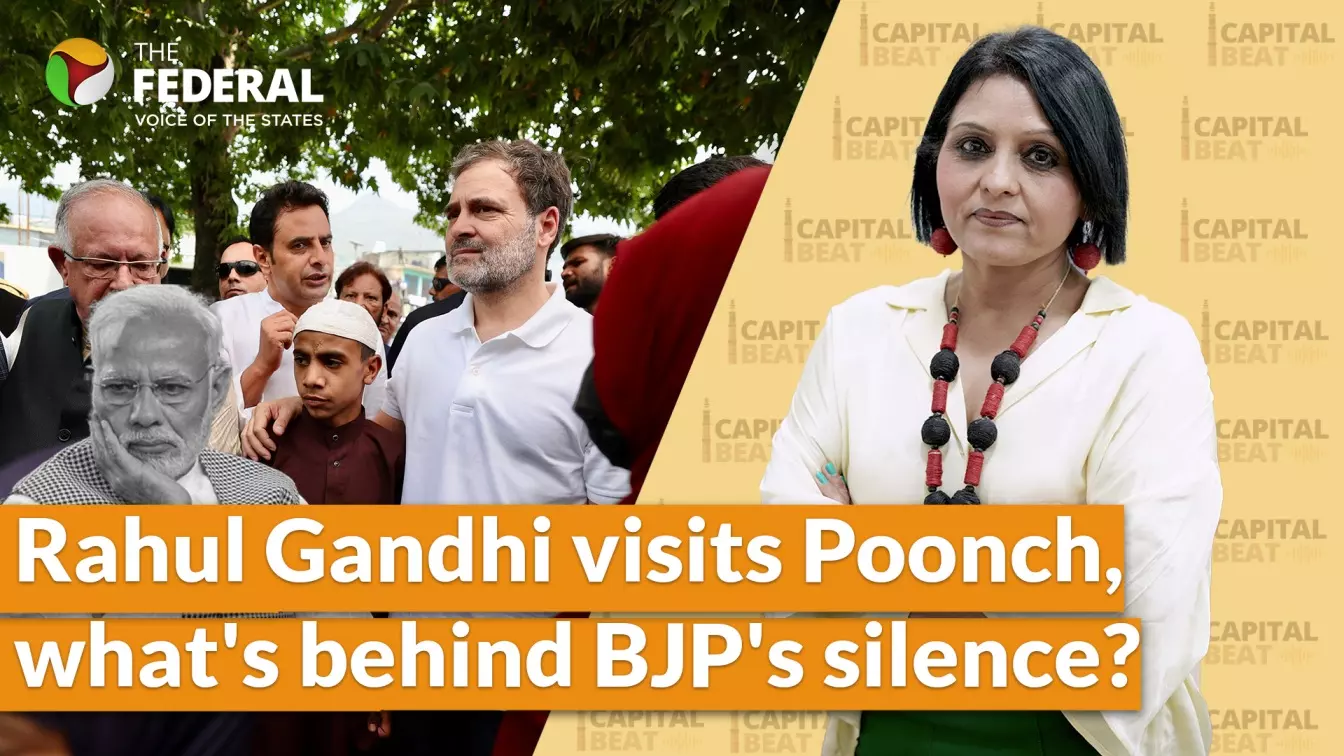
Discussion: Rahul Gandhi visits Poonch, but what's behind BJP's silence?
Rahul Gandhi and TMC reach out to grieving families in Poonch. But why is the BJP silent on deaths, compensation, and civilian suffering in J&K?

This episode of Capital Beat focused on the aftermath of Operation Sindoor and the growing silence of the BJP in Jammu and Kashmir.
Moderator Neelu Vyas hosted a panel comprising TK Rajalakshmi (Senior Deputy Editor, Frontline), Muzaffar Shah (Vice President, Awami National Conference), Suhail Kazmi (Editor-in-Chief, Daily Taskeen), and journalist Tarun Upadhyay.
Together, they questioned why the BJP and the central government avoided engaging with the destruction and civilian losses caused by cross-border shelling, while Opposition leaders made high-profile visits to the affected areas.
Centre's absence questioned
Kazmi emphasised that more than 16 people have died in Pir Panjal due to shelling, with schools, homes, and places of worship damaged. Despite this, he noted that the BJP leadership has remained conspicuously absent, neither visiting the area nor announcing ex gratia payments. He claimed that the silence is particularly glaring because the area is Muslim-majority: "This is also a Muslim-majority area, that's why BJP's tallest leader didn’t speak."
Also read: Rahul meets victims of Pak shelling in Poonch, says damage is 'big tragedy'
Kazmi said the Opposition's outreach — especially Rahul Gandhi’s visit to homes, temples, madrasas, and gurdwaras —highlighted the Centre's neglect. He added that this is not an isolated episode: "For 77 years, this is a regular phenomenon."
Tragedy ignored
Shah recounted harrowing details of the destruction, including a family that lost twin children. He decried the government’s refusal to acknowledge the humanitarian cost, stating, "No one from the BJP leadership came forward."
Also read: Operation Sindoor: What Vikram Misri told MPs ahead of their global trip
Shah argued that if India can send MPs abroad to explain Operation Sindoor, then Prime Minister Narendra Modi and his Cabinet should be able to visit affected Indian citizens. He pointed out that not even compensation has been announced, while "across the border, victims received one to 1.5 crore rupees."
Structural dysfunction
Both Shah and Kazmi highlighted the administrative disconnect in Jammu and Kashmir. While the Lieutenant Governor had visited some areas and promised jobs to affected families, Shah pointed out that the state government remained helpless under current governance structures: "You have a government which is trying its best, but can’t do anything."
Also read: Why India-Pak truce brings little cheer as uncertainty looms large
Shah warned that the continuing indifference towards civilian suffering will tear India’s secular fabric apart: "This is criminal silence and criminal negligence."
Missed political opportunity
Journalist Upadhyay provided a broader political context, stating that the BJP had banked heavily on support from Jammu, Poonch, and Rajouri. He noted that despite extensive campaigning and PM Modi’s 2023 rally in Poonch, top leaders have now stayed away: "It’s been 20 days and neither the PM nor the Home Minister has visited."
He also detailed the economic fallout: tourism is down, Amarnath Yatra footfall has plummeted, and marketplaces like Katra are empty. Compensation through NDRF or SDRF remains symbolic: "One lakh can't rebuild homes that suffered Rs 20 lakh in losses."
Opposition fills the void
Rajalakshmi pointed out the contradiction in the Centre’s behaviour. While it dispatched delegations abroad to justify its military actions, it ignored domestic relief and accountability: "It seems sensitive to what the global community thinks, but not to its own people."
She underlined that the Opposition has taken on the responsibilities the government should have: visiting affected citizens, demanding a special Parliament session, and calling for proper compensation. "Children have died. Civilians were sitting ducks. And there was no attempt to relocate them."
Narrative shift
Rajalakshmi concluded that the opposition now holds the stronger moral and political narrative: "The government owes the people answers. Being curious is not anti-national." The BJP’s silence is not just a tactical mistake, she argued, but a moral failure in governance.
(The content above has been generated using a fine-tuned AI model. To ensure accuracy, quality, and editorial integrity, we employ a Human-In-The-Loop (HITL) process. While AI assists in creating the initial draft, our experienced editorial team carefully reviews, edits, and refines the content before publication. At The Federal, we combine the efficiency of AI with the expertise of human editors to deliver reliable and insightful journalism.)

